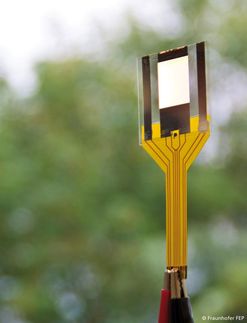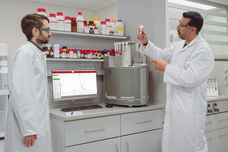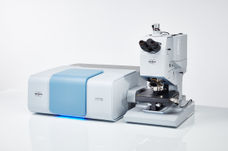BMBF Project “Polytos2: Printed Organic Circuits and Memory” successfully completed
After two years of intense collaboration with nine other consortium partners Merck, the consortium leader, has successfully completed the Polytos2 project funded with a sum of EUR 4.8 million by the German Federal Ministry of Research and Education (BMBF).
Within the scope of this project, Merck developed new semiconductor polymers with high charge carrier mobility as well as other organic materials for producing printed transistors and circuits and designed for organic electronics applications. Printing machines specifically developed to meet the properties of such materials enable easy, low-cost printing of the electronic components onto plastic films. As the properties of these innovative components differ completely from those of conventional components based on silicon technology, this will open up totally new applications.
One example are smart labels, which are equipped with a temperature sensor and intended for use in food monitoring. Also readers designed specifically for organic electronics have been developed, as well as software solutions that make it possible to read and efficiently handle logistic and product-related data. This has created the basis for the future development of novel organic electronics applications at InnovationLab in Heidelberg.
A main focus of the project was on establishing a foundry at InnovationLab in Heidelberg. This is a modular system consisting of standard circuit elements that makes it possible to find tailored solutions for specific product requirements quickly and efficiently.
Apart from Merck, the following companies and institutes participated in the project: BASF SE, Heidelberger Druckmaschinen AG, Mannheim University of Applied Sciences, Pepperl + Fuchs GmbH, PolyIC GmbH &Co. KG, Robert Bosch GmbH, SAP AG, TU Darmstadt, Heidelberg University, and University of Mannheim. Associated partners were Innovation-Lab GmbH and VARTA Microbattery GmbH.
Polytos2 was the follow-up project of Polytos. This three-year project was successfully completed in February 2012 and was also funded by the BMBF as part of the “Forum Organic Electronics” Rhine-Neckar excellence cluster.
Other news from the department science
These products might interest you
Most read news
More news from our other portals
See the theme worlds for related content
Topic world Sensor technology
Sensor technology has revolutionized the chemical industry by providing accurate, timely and reliable data across a wide range of processes. From monitoring critical parameters in production lines to early detection of potential malfunctions or hazards, sensors are the silent sentinels that ensure quality, efficiency and safety.

Topic world Sensor technology
Sensor technology has revolutionized the chemical industry by providing accurate, timely and reliable data across a wide range of processes. From monitoring critical parameters in production lines to early detection of potential malfunctions or hazards, sensors are the silent sentinels that ensure quality, efficiency and safety.























































